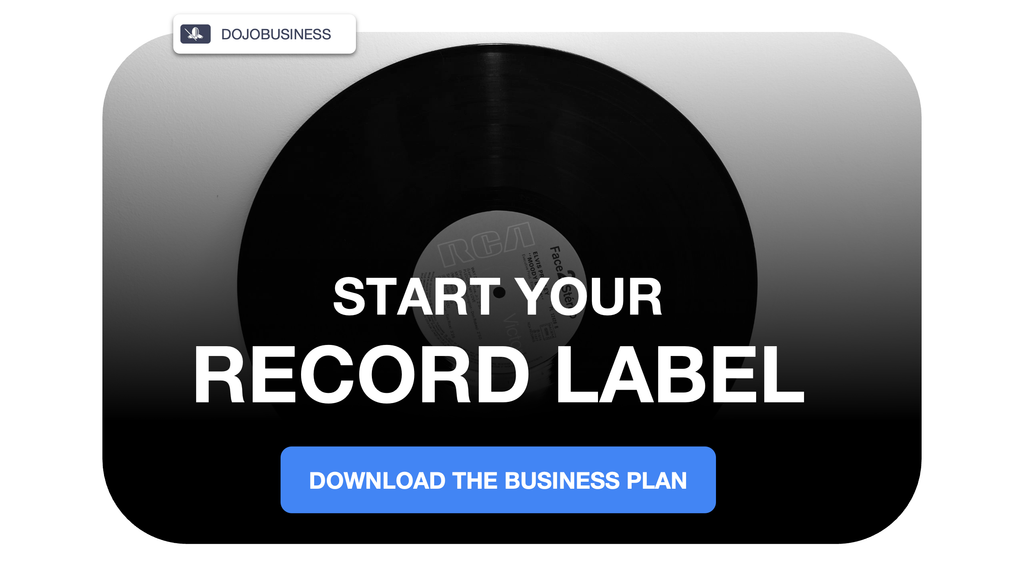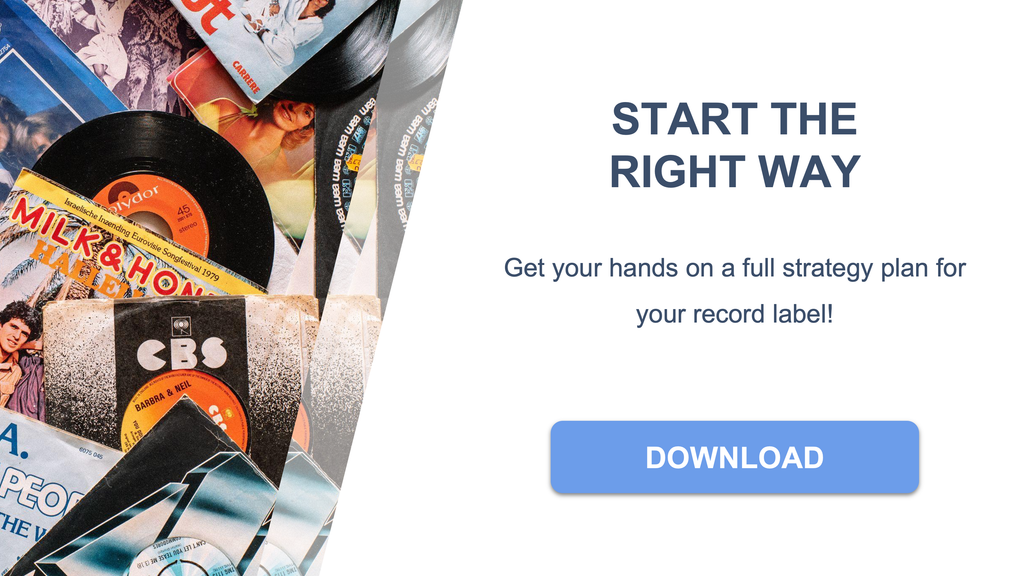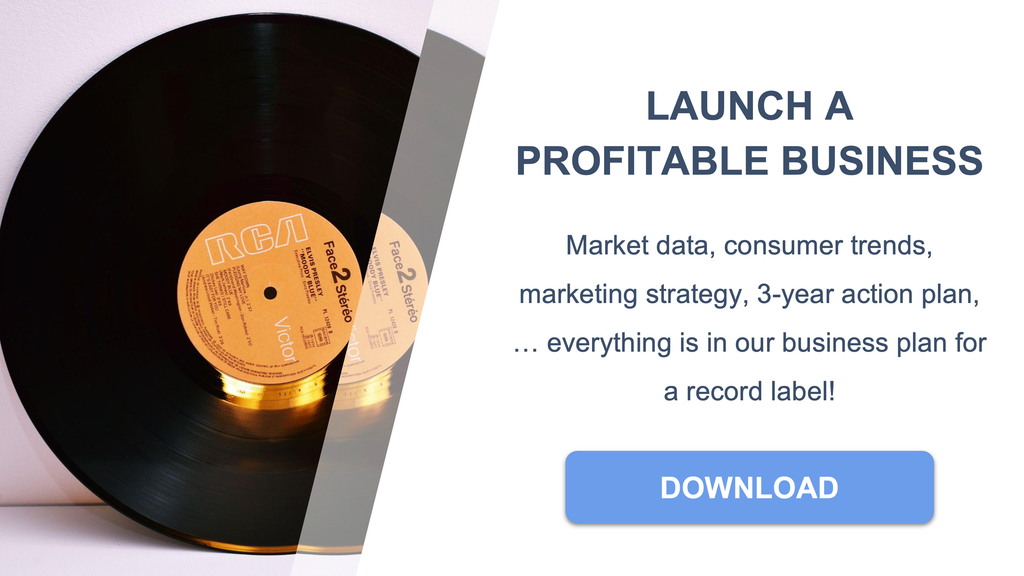
If you're passionate about music and envision launching your own record label but are unsure of the first steps to take, you've come to the perfect spot.
In the content that follows, we will present you with a comprehensive sample business plan tailored for a record label.
As you might be aware, a meticulously developed business plan is crucial for any aspiring entrepreneur. It serves as a roadmap, outlining your vision, objectives, and strategies for your venture.
To craft a winning plan with ease and precision, you can utilize our record label business plan template. Additionally, our specialists are on hand to review and refine it at no extra cost.

How to draft a great business plan for your record label?
A good business plan for a record label must capture the unique dynamics of the music industry.
Initially, it is crucial to provide a comprehensive overview of the music market. This includes current statistics and the identification of emerging trends within the industry, as illustrated in our record label business plan template.
Your business plan should articulate your vision clearly. Define your niche (such as a specific music genre), your target audience (independent artists, established musicians, or both), and your label's distinctive brand (innovative, traditional, genre-specific, etc.).
Market analysis is a key component. This requires an in-depth look at the competitive landscape, understanding the shifts in music consumption, and recognizing the potential fanbase for your artists.
For a record label, it's imperative to detail your artist roster and catalog. Describe the type of artists you aim to sign, the genres you will focus on, and how you plan to support and develop your talent.
The operational plan should outline the structure of your label, including A&R (Artists and Repertoire) processes, recording and production facilities, distribution channels, and partnerships with music platforms.
Quality of production, artist development, and intellectual property management are critical areas to emphasize for a record label.
Marketing and sales strategies must be addressed next. How will you promote your artists and releases? Consider your approach to PR campaigns, social media marketing, touring, merchandise, and fan engagement.
Incorporating digital strategies is non-negotiable in the modern music industry. This includes streaming services, digital downloads, and a robust online presence.
The financial section is vital. It should encompass the initial investment, revenue projections, cost analysis, and the point of profitability.
Record labels often deal with variable income streams, so a thorough understanding of your financials is essential. For assistance, refer to our financial forecast for a record label.
Compared to other business plans, a record label's plan must pay special attention to the rapidly changing technology in music distribution, the importance of intellectual property rights, and the strategies for artist development and branding.
A well-crafted business plan will not only help you to define your strategy and operations but also to attract artists, partners, and investors.
Investors and lenders are looking for a solid market analysis, realistic financial projections, and a clear plan for artist management and growth.
By presenting a detailed and substantiated plan, you showcase your knowledge of the music industry and your commitment to the success of your record label.
To achieve these goals efficiently, you can start with our record label business plan template.

A free example of business plan for a record label
Here, we will provide a concise and illustrative example of a business plan for a specific project.
This example aims to provide an overview of the essential components of a business plan. It is important to note that this version is only a summary. As it stands, this business plan is not sufficiently developed to support a profitability strategy or convince a bank to provide financing.
To be effective, the business plan should be significantly more detailed, including up-to-date market data, more persuasive arguments, a thorough market study, a three-year action plan, as well as detailed financial tables such as a projected income statement, projected balance sheet, cash flow budget, and break-even analysis.
All these elements have been thoroughly included by our experts in the business plan template they have designed for a record label.
Here, we will follow the same structure as in our business plan template.

Market Opportunity
Market Data and Figures
The music industry is a dynamic and evolving sector with significant impact.
As of recent estimates, the global recorded music market revenue is valued at over 20 billion dollars, with projections indicating continued growth driven by streaming services and digital sales.
In the United States, there are thousands of record labels, ranging from major companies to independent labels, contributing to a multi-billion-dollar industry that plays a vital role in the country's cultural and economic landscape.
These figures underscore the record label's critical position in the entertainment sector and its substantial contribution to the global economy.
Trends
Current trends in the music industry show a shift towards digital consumption, with streaming services dominating the market.
The rise of social media platforms has revolutionized music promotion, allowing artists to engage directly with their fans and build their brands independently.
There is also a growing interest in vinyl records and other physical formats, as consumers seek tangible connections with music in the digital age.
Artists are increasingly exploring innovative revenue streams, such as live streaming performances, merchandise, and fan-funded projects.
Moreover, there is a heightened focus on diversity and inclusion within the industry, with movements advocating for equal representation and opportunities for underrepresented groups.
These trends highlight the music industry's adaptability and responsiveness to the changing preferences and values of modern consumers.
Success Factors
The success factors for a record label are multifaceted and crucial for its sustainability.
First and foremost, discovering and nurturing talent is at the heart of a record label's success. Signing artists with unique sounds and strong market potential is essential.
Effective marketing and promotion strategies are also key to ensuring that artists and their music reach the widest possible audience.
Building strong relationships with distribution channels, including streaming services, radio stations, and retailers, is vital for maximizing sales and exposure.
Adaptability to the rapidly changing music landscape, including technological advancements and consumer behavior shifts, is necessary for long-term viability.
Lastly, a commitment to artist development and support, coupled with sound financial management, will help a record label thrive in a competitive and ever-changing industry.

The Project
Project Presentation
Our record label project is designed to cater to the evolving landscape of the music industry, focusing on the discovery and promotion of artists who bring unique sounds and innovative music. Situated in a vibrant cultural hub, our label will specialize in a variety of genres, with an emphasis on supporting independent musicians and providing them with a platform to reach a wider audience.
We aim to harness the power of digital distribution, social media marketing, and live events to showcase our artists' talents. Our commitment is to produce high-quality recordings that capture the essence of each artist's creativity and style.
Our record label aspires to be a beacon for music innovation, nurturing talent and delivering fresh and compelling music to a global audience.
Value Proposition
The value proposition of our record label lies in our dedication to nurturing and promoting independent artists with a distinct voice and sound. We offer a partnership that extends beyond traditional record deals, providing comprehensive support including production, marketing, and distribution.
Our commitment to artistic integrity, combined with cutting-edge promotion strategies, ensures that our musicians receive the exposure and recognition they deserve. We strive to create a collaborative community where artists can thrive and fans can discover new music that resonates with them.
Our label is more than a business; it's a movement to empower musicians and redefine the music industry by prioritizing talent and authenticity over commercial conformity.
Project Owner
The project owner is a music industry veteran with a passion for discovering and fostering musical talent. With a background in A&R, music production, and artist management, they possess the expertise to identify potential hits and guide artists to success.
With a deep understanding of the challenges faced by independent musicians, the owner is committed to creating a supportive environment that allows artists to focus on their craft while the label handles the complexities of the music business.
Driven by a love for music and a desire to disrupt the industry with a fresh approach, the project owner is the visionary leader of the label, dedicated to making a lasting impact on the music scene and providing a voice for the next generation of groundbreaking artists.

The Market Study
Target Market
The target market for our record label is segmented into various groups.
Firstly, we have music enthusiasts who are constantly seeking new and unique sounds, especially from emerging and independent artists.
Additionally, there are fans of specific genres that our label specializes in, who are dedicated to supporting and discovering artists within that niche.
Another segment includes aspiring musicians looking for a label that can provide personalized attention and support to kickstart their careers.
Lastly, industry professionals such as music producers, event organizers, and other labels could form strategic partnerships, enhancing our reach and influence in the music scene.
SWOT Analysis
Our SWOT analysis for the record label identifies several key factors.
Strengths include a dedicated team with a keen ear for talent, strong industry connections, and a commitment to artist development and creative freedom.
Weaknesses might involve the challenge of breaking new artists into a saturated market and the financial risks associated with artist promotion and production costs.
Opportunities can be found in the rise of digital music platforms, which can amplify our artists' reach, and in the potential for live event promotion as a revenue and exposure stream.
Threats include the rapidly changing music industry landscape, the dominance of major labels, and the volatility of music trends and consumer tastes.
Competitor Analysis
Our analysis of competitors within the music industry indicates a mix of large-scale and independent record labels.
Major labels have the advantage of extensive resources and established distribution channels, while other indie labels offer a more grassroots and artist-centric approach.
To compete effectively, we must leverage our unique selling points, such as our genre specialization, artist-friendly contracts, and innovative marketing strategies.
Understanding the strengths and weaknesses of these competitors will be crucial in carving out our niche and establishing a loyal artist and fan base.
Competitive Advantages
Our record label's competitive advantages lie in our passion for music and commitment to our artists.
We focus on discovering and nurturing talent, providing them with the resources and guidance to develop their artistry and reach their full potential.
Our hands-on approach ensures that artists feel supported and valued, which in turn fosters loyalty and long-term partnerships.
Additionally, our adaptability to the ever-evolving digital music landscape allows us to stay ahead of trends and offer our artists innovative platforms for exposure.
You can also read our articles about:
- how to start a record label: a complete guide
- the customer segments of a record label
- the competition study for a record label

The Strategy
Development Plan
Our three-year development plan for the record label is designed to establish a strong foothold in the music industry.
In the first year, we will concentrate on talent acquisition and establishing a solid artist roster, while also building our brand identity and reputation.
The second year will focus on expanding our distribution channels, both digital and physical, and increasing our presence in key music markets.
In the third year, we aim to diversify our music portfolio, explore cross-promotional opportunities with other entertainment sectors, and consider international expansion.
Throughout this period, we will remain dedicated to discovering and promoting innovative music, supporting our artists, and staying ahead of industry trends to ensure the growth and success of our label.
Business Model Canvas
The Business Model Canvas for our record label targets emerging and established artists seeking innovative production and promotion strategies.
Our value proposition lies in providing a platform for artists to develop their careers, utilizing cutting-edge marketing techniques, and offering a fair and transparent profit-sharing model.
We distribute music through various channels, including streaming services, physical sales, and live performances, relying on our industry connections and marketing expertise.
Key activities include talent scouting, music production, marketing, and artist management.
Our revenue streams are generated from music sales, streaming royalties, merchandise, and live event promotions, while our costs are associated with production, artist advances, and promotional activities.
Access a complete and editable real Business Model Canvas in our business plan template.
Marketing Strategy
Our marketing strategy is centered on creating a strong brand presence and fostering a loyal fan base for our artists.
We aim to leverage social media platforms, music videos, and strategic collaborations to increase visibility and engagement.
Our label will also host showcase events and participate in music festivals to promote our artists and releases.
Additionally, we will partner with influencers and other brands to expand our reach and tap into new audiences.
Our commitment to artist development and innovative marketing will help us stand out in a competitive industry.
Risk Policy
The risk policy for our record label is focused on mitigating risks associated with the volatile nature of the music industry.
We will carefully select artists with growth potential and diversify our music portfolio to reduce dependency on any single genre or artist.
Our contracts will be structured to balance investment with potential returns, and we will maintain a flexible approach to adapt to changing market trends.
We will also secure comprehensive insurance to protect against legal and financial liabilities related to our business activities.
Our priority is to build a sustainable label that supports artists and delivers quality music to our audience while managing risks effectively.
Why Our Project is Viable
We are passionate about launching a record label that nurtures talent and introduces fresh sounds to the music scene.
With our strategic approach to artist development, marketing, and distribution, we believe we can carve out a unique space in the industry.
We are excited to empower artists and deliver exceptional music experiences to audiences worldwide.
We are prepared to adapt to the industry's dynamics and are optimistic about the future of our record label.
You can also read our articles about:
- the Business Model Canvas of a record label
- the marketing strategy for a record label

The Financial Plan
Of course, the text presented below is far from sufficient to serve as a solid and credible financial analysis for a bank or potential investor. They expect specific numbers, financial statements, and charts demonstrating the profitability of your project.
All these elements are available in our business plan template for a record label and our financial plan for a record label.
Initial expenses for our record label include setting up a professional recording studio, acquiring high-quality sound equipment, securing licenses and rights for music production, hiring experienced music producers and sound engineers, as well as costs related to brand creation and launching targeted marketing campaigns to promote our artists and releases.
Our revenue assumptions are based on a thorough analysis of the music industry trends, digital streaming growth, and the potential fanbase for the genres we aim to produce.
We anticipate progressively increasing sales, starting modestly and growing as the reputation of our record label and the popularity of our signed artists develop.
The projected income statement indicates expected revenues from music sales, streaming, licensing, and artist performances, production costs (studio time, equipment maintenance, artist advances), and operating expenses (rent, marketing, salaries, etc.).
This results in a forecasted net profit crucial for evaluating the profitability of our business over time.
The projected balance sheet reflects assets specific to our business, such as studio equipment, music catalogs, and liabilities including debts and anticipated expenses.
It shows the overall financial health of our record label at the end of each period.
Our projected cash flow budget details incoming and outgoing cash flows, allowing us to anticipate our cash needs at any given time. This will help us effectively manage our finances and avoid cash flow problems.
The projected financing plan lists the specific financing sources we plan to use to cover our startup expenses.
The working capital requirement for our record label will be closely monitored to ensure we have the necessary liquidity to finance our daily operations, including artist development, production costs, and salary payments.
The break-even point specific to our project is the level of sales needed to cover all our costs, including startup expenses, and start making a profit.
It will indicate when our business will be profitable.
Performance indicators we will track include the profit margin rate on our music sales, the liquidity ratio to assess our ability to cover financial obligations, and the return on investment to measure the effectiveness of our capital invested in the project.
These indicators will help us evaluate the financial health and overall success of our record label.
If you want to know more about the financial analysis of this type of activity, please read our article about the financial plan for a record label.

